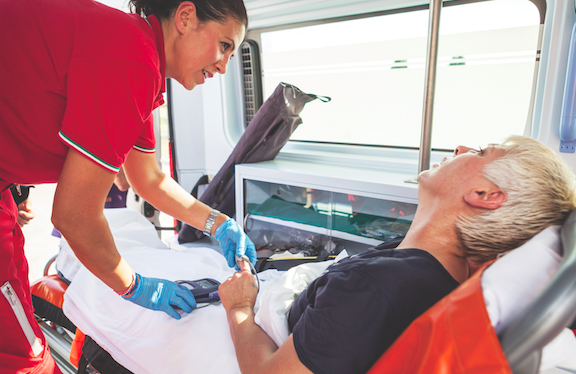North Carolina program has reduced the number of ED transports, but EMS reimbursement has yet to catch up to paradigm of on-scene treatment
A 38-year-old man dials 911 because he wants to kill himself. Patients like this are usually taken to the local ED, but the WakeCounty, NC, EMS system has trialed a novel approach.
In the US, there were over 4.6 million ED visits for mental health care from 2009-2010 [1], and those numbers are only increasing. Mental health resources everywhere are already stretched thin, so ED wait times for evaluation and disposition planning can extend into days. Patients sometimes need extensive medical evaluation first, evaluations which can contribute to prolonged ED length of stay. Exacerbating the problem is a psychiatric bed shortage. National goals recommend 50 psychiatric beds per 100,000 people, but North Carolina currently offers 10.6 beds per 100,000 [2], and waits for a state hospital bed are upwards of 63.1 hours [5].
In North Carolina, Wake County Emergency Medical Services has developed an innovative approach to tackling the problem of overcrowding and extended length of stay in local emergency departments. Through an “Alternative Destination Protocol,” the county EMS system can bypass the ED evaluation and go directly to a mental health facility.
Specially-trained Wake County Advanced Practice Paramedics are dispatched to all calls with mental health and substance abuse complaints. Paramedics identify any acute medical concerns requiring ED evaluation. If no concerns are identified, patients are transported to one of several mental health facilities in the area.
Specific criteria must be met for the protocol. First, patients must not require sedation for agitation or have an acute change in mental status. Vital signs must include a pulse less than 120 and no other significant abnormalities. The patient cannot have any acute medical concerns. For the alternative destination protocol, breathanalyzer readings in Wake County must be ≤0.030-40% blood alcohol level (BAL). Several alternative destinations are available, and each has its own standard for BAL. Patients should be able to perform the activities of daily living. Blood glucose must be < 300mg/dL. If these criteria are met and a local facility has space for intake assessment, EMS can take the patient directly to that facility [4].
The Alternative Destination pilot project, which was established in 2009, has successfully reduced the number of emergency department transports by 764 over the past two years, compared to a total of 3,831 mental health or substance abuse EMS evaluations from January 2013 through January 2015 [6], a 20% drop in potential ED visits.
Currently, 20 Advanced Practice Paramedics have been deployed, with an additional 30 paramedics trained. The course consists of 240 hours of education on local mental health resources, patient evaluation and assessment. Wake County EMS and Wake Technical Community College and the NC Department of Health and Human Services provided support and funding. Limited funding to train advanced practice paramedics across the state [7]. has also been provided.
This program has saved approximately $500,000 in Medicaid costs over a recent 12 month period [9]. By bypassing the medical evaluation required for ultimate transfer to a psychiatric hospital, patients receive fewer laboratory and imaging studies as well as lower fees for physician evaluation and hospital stays.
While Medicaid costs have been reduced, the protocol has resulted in cuts for EMS reimbursement. EMS reimbursements are based almost solely on ambulance transport to an ED. There is generally no reimbursement for service calls, on-scene treatment or transport to somewhere other than an ED. However, by bypassing likely unnecessary, extensive medical evaluation and diverting care directly to mental health facilities, EMS is achieving a greater good for the emergency medical care system.
The ultimate goal is to restructure EMS reimbursements to include home visits, alternative destination evaluations and transport, amongst other services. Potentially public and private insurers would offer these reimbursements with the overall cost-savings in mind.
Local government is also taking notice. A 2011 report on the state of health care in North Carolina recognized the need for improving access to mental health services through programs like the Wake County Alternative Destination project [8].
Due to the success in Wake County, other EMS systems across the country are now adopting a similar approach to mental health evaluation. Currently there are over 260 programs nationwide with similar alternative destination protocols [9]. Over time, and in the appropriate settings, we anticipate that such plans can become a standard for pre-hospital mental health care.
REFERENCES
1. www.cdc.gov/nchs/data/ahcd/combined_tables/AMC_2009-2010_combined_web_table01.pdf
2. No Room at the Inn: Trends and consequences of closing public psychiatric hospitals. Treatment Advocacy Center, 2014. Nccivitas.org.
3. D Richard. NC Psychiatric Bed Need vs Capacity. NC Department of Health and Human Services. February 24, 2014. Ncleg.net.
4. Protocols 11 (Well Person Check) and 92 (Medical Clearance for Mental Health/Substance Abuse Patients) . Wake County, North Carolina Emergency Medical Services. 2015.http://www.wakegov.com/ems/medical/Documents/2013%20Treatment%20Protocols.pdf accessed May 4, 2015.
5. G Akland and A Akland. State Psychiatric Hospital Admission Delays in North Carolina: January-June 2015. National Alliance on Mental Illness, Wake County.
6. Personal Communications with Michael Bachman MHS, EMT-P.
7. Crisissolutionsnc.org. Accessed April 30, 2015.
8. Healthy North Carolina 2020: A better state of health. Morrisville, NC: North Carolina Institute of Medicine. 2011.
9. J Murawksi. Wake County Has One Solution to Overcrowded Emergency Rooms. The News and Observer. March 14, 2015.









